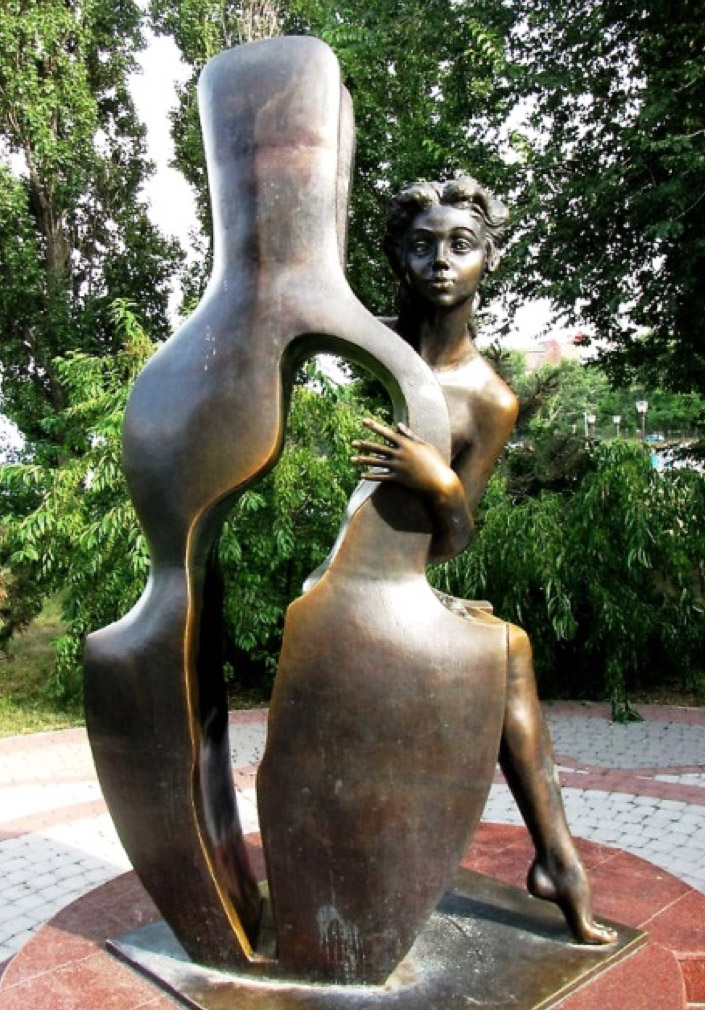Romance with a Double Bass
for Narrator, Double Bass & Piano (2018)
based on the short story by Anton Chekhov
Duration: 15 minutes
Commissioned by Gary Karr
Premiere Performance: February 8, 2019
Daniel Nix, Contrabass; Mikhail Berestnev, Piano; Mary-Margaret Pyeatt, Narrator
University of Texas at Dallas
Romance with a Double Bass, Taganrog, Russia

Reviews:
An artist whose music embraces humor, heavy attention to mood and might be described as ‘romantically dramatic’, Robert Xavier Rodríguez pens “Romance With A Double Bass” for narrator, double bass, and piano, based on a comic short story by Anton Chekhov… [The work] places Daniel Nix on double bass, Mikhail Berestnev on piano and Mary-Margaret Pyeatt on narration for the engaging storytelling that’s eloquent and complements the unpredictable and mature musicianship superbly. The listen continues Rodriguez’s position as an animated and creative composer with a sense of humor, and the instrumentation and wordplay from Pyeatt only add to the appeal of his inimitable vision.
– TAKE EFFECT REVIEWS
Romance with a Double Bass… features a spoken narration with musical accompaniment. The most well-known example of that genre is Prokofiev’s Peter and the Wolf for speaker and orchestra; Rodriguez continues that tradition here with a smaller instrumental ensemble of double bass and piano, but with the same aura of pungent humor and pictorial representation… Beneath the outrageous joke, Chekhov—and, by extension, Rodriguez—create a parable of the plight of the artist in an unfair world.
As in all of his works, lyricism abounds in Rodriguez’s score; here, he indulges in comical sound effects tempered with a skillful, subtle counterpoint... Rodriguez’s innate command of instrumental color is also evident throughout, particularly in the piano part, with its gorgeous sonorities, but also in the wonderful blending of the timbres of piano and double bass, encapsulated in the final seconds, with its leap from resonant high registers of both instruments to a tragi-comic explosion in the low registers.”
– Wayne Lee Gay, TheaterJones.com
Composer’s Note:
Romance With a Double Bass (2018) for Narrator, Contrabass and Piano is the result of a commission from my friend and colleague Gary Karr for his protégé, Daniel Nix. Nix gave the premiere performance on February 8 2019 at the University of Texas at Dallas with Mikhail Berestnev, piano and Mary-Margaret Pyeatt, narrator. Karr and I had collaborated earlier with Ursa: Four Seasons for Contrabass and Orchestra (1990), commissioned by the National Endowment for the Arts, which he premiered with the San Antonio Symphony. The work is dedicated to Gary Karr and Harmon Lewis, pianist..
The Romance is based on a comic short story by Russian playwright Anton Chekhov (1860-1904). Smichkov, a double bass player, is on his way to play at the wedding of a princess. He stops for a swim in a lake and sees a beautiful girl napping and holding a fishing line on the shore. Admiringly, he ties a bouquet to her line and swims away. When she awakens, she finds the bouquet and, likewise, goes for a swim. While Smichkov and the girl are swimming, separately, thieves steal their clothes. Both naked, Smichkov and the girl meet at a bridge, and the girl reveals that she is the princess. Smichkov puts the princess inside his double bass case to carry her to safety, but he drops the case when he suddenly runs after shadows he thinks are the thieves. While Smichkov is away, some of Smichkov’s fellow musicians come by and see the case. Thinking it contains Smichkov’s double bass, they take it with them to the palace. At the palace, the entire wedding party opens the case and discovers the naked princess inside. Smichkov, still naked and now alone at the bridge, mourns for the princess, and, to this day, he is heard playing his double bass in hopes of finding her.
In keeping with the Russian setting, the score specifies that the narrator speak with a “lovable Russian accent.” The words must be timed exactly to the music, spoken sometimes during pauses in the music and sometimes while the music is playing. The musical setting is both playful and tender, with free atonality merging with diatonic sweetness. The writing for the contrabass is virtuosic, notated for scordatura solo tuning (a step higher than usual) with extended use of harmonics, double stops, slides and high registers. Following the model of Peter and the Wolf, by Chekhov’s compatriot Serge Prokofiev, there are leitmotifs which recur with variations throughout the work to depict the characters and events.